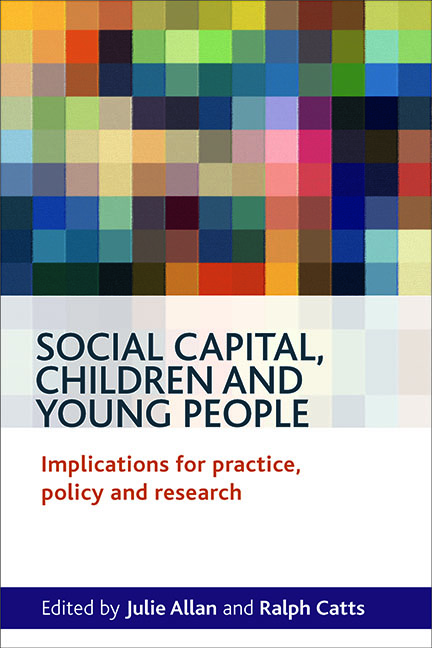five - Youth club connections
Published online by Cambridge University Press: 01 September 2022
Summary
Introduction
The effects of social capital on the development of opportunities and aspirations for participants in a Scottish youth club, based in an urban area of deprivation, were investigated over a period of fifteen months. The youth club operated from the community wing of a new build primary school on Friday nights and was given financial support by the local authority. The club was primarily run by parent volunteers and local authority sessional staff with a janitor present. Most of the young people lived in the community where the club was located. At any one time about half the participants were boys and half were girls and their ages ranged between 12 and 14 years.
New participants attending secondary school were allowed to join at any time but were particularly recruited in the final weeks of their primary schooling. Those who continued normally remained engaged for the first two years of secondary schooling. The club had a natural turnover as some moved on and others joined. Most young people who joined continued regularly for at least six months and some for more than two years. The youth club offered a place where young people could develop their social networks with peers and also their connections with trusted adults. Eighteen young people, including three who were involved with the club for just one week, voluntarily participated in this study.
The key purpose of this research was to examine how connections among young people and volunteers in a youth club affect their immediate and medium-term social, economic and cultural needs. Other research questions included whether the youth club provided benefits as a social amenity to the community, encouraged a reduction in territorialism and provided those involved with positive choices and chances, as stated in the Scottish Government's More Choices, More Chances policy (Scottish Government, 2006). Consideration was also given to how the policies of the local authority are implemented and the effect they have on the operation of a youth club.
- Type
- Chapter
- Information
- Social Capital, Children and Young PeopleImplications for Practice, Policy and Research, pp. 77 - 98Publisher: Bristol University PressPrint publication year: 2012



